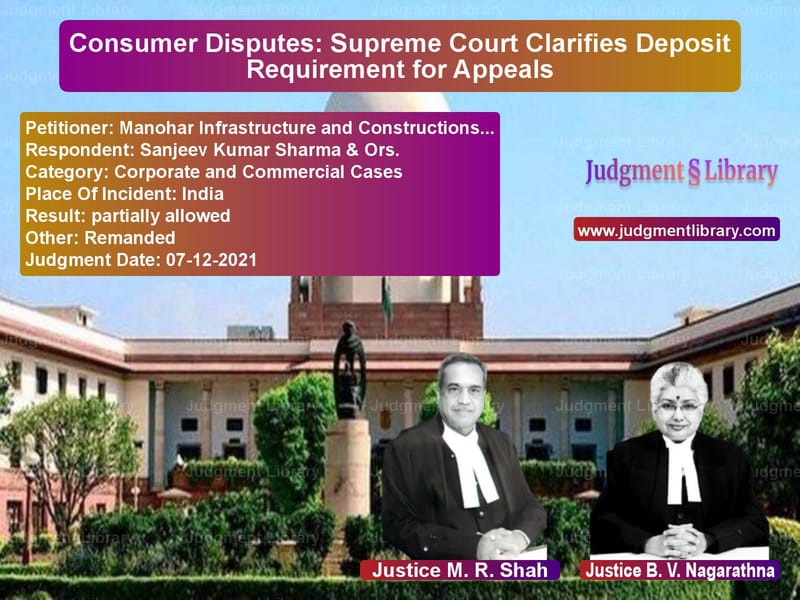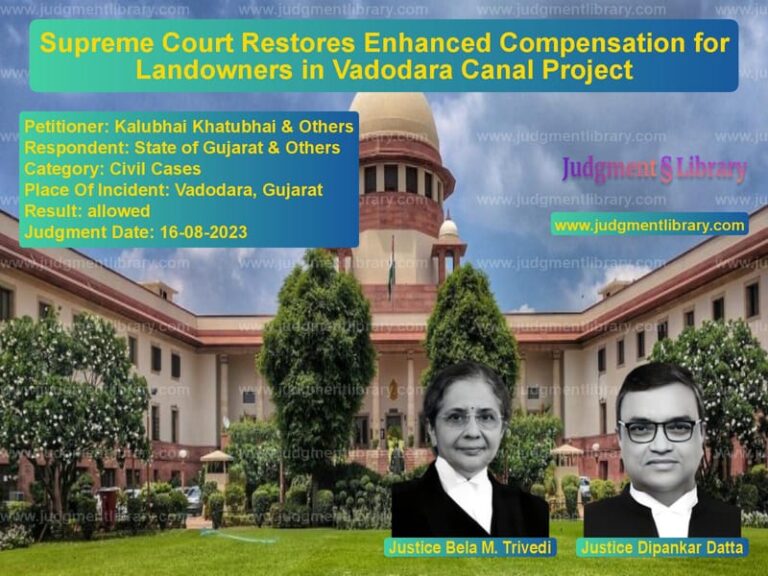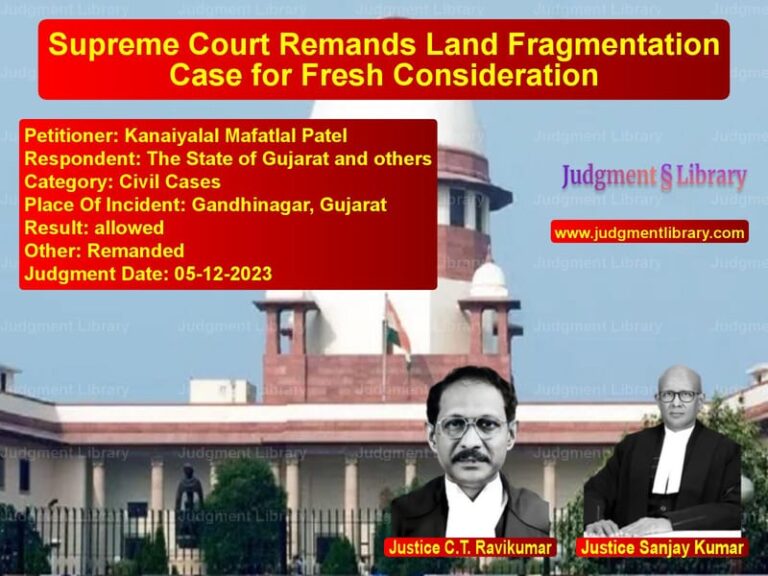Consumer Disputes: Supreme Court Clarifies Deposit Requirement for Appeals
The Supreme Court of India recently delivered an important judgment clarifying the deposit requirements for builders and developers filing appeals before the National Consumer Disputes Redressal Commission (NCDRC). The case involved multiple appeals by real estate developers challenging orders passed by the State Consumer Disputes Redressal Commissions, which had directed them to refund money to homebuyers. The judgment provides clarity on whether appellants must deposit the entire decretal amount or only 50% while seeking a stay on refund orders.
Background of the Case
Several homebuyers had approached the State Consumer Disputes Redressal Commissions against real estate developers, including Manohar Infrastructure & Constructions Pvt. Ltd. and TDI Infrastructure Ltd. The State Commissions directed the developers to refund amounts paid by homebuyers, along with interest.
The developers, feeling aggrieved, filed appeals before the NCDRC under Section 51 of the Consumer Protection Act, 2019. The NCDRC granted a stay on the refund orders but directed the developers to deposit the entire decretal amount. The developers challenged these orders before the Supreme Court, arguing that they should only be required to deposit 50% of the decretal amount, as mandated under the second proviso to Section 51 of the Consumer Protection Act, 2019.
Arguments Presented by the Appellants
The developers, represented by Senior Advocate Sidharth Dave and Advocate Kanika Agnihotri, made the following arguments:
- The second proviso to Section 51 states that an appellant is required to deposit only 50% of the decretal amount before an appeal is entertained by the NCDRC.
- The NCDRC’s direction to deposit the entire decretal amount exceeded its jurisdiction, as there was no statutory requirement to deposit more than 50%.
- The deposit of 50% should be sufficient to stay the operation of the State Commission’s order.
- The NCDRC passed its order mechanically without assigning any reasons for requiring a higher deposit.
- By imposing the requirement to deposit the entire decretal amount, the NCDRC effectively denied the appellants their right to appeal.
Arguments Presented by the Respondents
The homebuyers, represented by their counsel, countered the arguments with the following points:
- The State Commission’s order was akin to a money decree, directing the developers to refund amounts already paid by homebuyers.
- Since the developers had collected money from homebuyers, they should be required to deposit the entire amount while seeking a stay.
- The Supreme Court had, in previous cases, upheld similar deposit requirements imposed by the NCDRC.
- The NCDRC had discretion to impose conditions while granting a stay, and it was justified in directing the deposit of the entire decretal amount.
Supreme Court’s Ruling
The Supreme Court examined the provisions of the Consumer Protection Act, 2019, and analyzed previous judicial precedents. The key observations of the Court were:
- The second proviso to Section 51 mandates that an appellant must deposit at least 50% of the decretal amount before their appeal can be entertained.
- The requirement to deposit 50% is a condition precedent for filing an appeal, but it does not restrict the NCDRC’s power to impose additional conditions while granting a stay.
- The NCDRC does have the discretion to direct appellants to deposit more than 50% if it deems it necessary, but such orders must be supported by reasons.
- Stay orders should not be passed mechanically. The NCDRC must assign reasons if it requires a deposit beyond 50% of the decretal amount.
- While the Consumer Protection Act is intended to safeguard consumers, it must also ensure that appellants have a fair opportunity to contest orders.
The Court clarified:
“Pre-deposit of 50% of the amount as ordered by the State Commission under the second proviso to Section 51 of the Consumer Protection Act, 2019, is mandatory for the entertainment of an appeal by the National Commission. However, while considering the stay application, the National Commission has the discretion to direct the deposit of the entire amount or any higher amount, but it must assign reasons for doing so.”
Key Legal Precedents Considered
- Shreenath Corporation v. Consumer Education and Research Society – The Supreme Court ruled that the requirement to deposit 50% is distinct from conditions imposed for granting a stay.
- State of Haryana v. Maruti Udyog Ltd. – The Court held that a statutory pre-deposit requirement does not limit the discretionary power of appellate authorities.
- Order XLI Rule 5, Civil Procedure Code – The Court applied the principle that, in money decrees, a stay should be conditional upon the deposit of an appropriate amount.
Final Verdict
The Supreme Court remanded the matter back to the NCDRC, directing it to reconsider the stay applications and pass fresh orders in light of its ruling. The NCDRC was instructed to provide reasons if it required deposits exceeding 50% of the decretal amount.
This judgment clarifies the distinction between statutory pre-deposit requirements and discretionary stay conditions, ensuring a balanced approach that protects consumer rights while upholding the right of developers to appeal.
Petitioner Name: Manohar Infrastructure and Constructions Private Limited.Respondent Name: Sanjeev Kumar Sharma & Ors..Judgment By: Justice M. R. Shah, Justice B. V. Nagarathna.Place Of Incident: India.Judgment Date: 07-12-2021.
Don’t miss out on the full details! Download the complete judgment in PDF format below and gain valuable insights instantly!
Download Judgment: manohar-infrastructu-vs-sanjeev-kumar-sharma-supreme-court-of-india-judgment-dated-07-12-2021.pdf
Directly Download Judgment: Directly download this Judgment
See all petitions in unfair trade practices
See all petitions in Consumer Rights
See all petitions in Judgment by Mukeshkumar Rasikbhai Shah
See all petitions in Judgment by B.V. Nagarathna
See all petitions in partially allowed
See all petitions in Remanded
See all petitions in supreme court of India judgments December 2021
See all petitions in 2021 judgments
See all posts in Corporate and Commercial Cases Category
See all allowed petitions in Corporate and Commercial Cases Category
See all Dismissed petitions in Corporate and Commercial Cases Category
See all partially allowed petitions in Corporate and Commercial Cases Category







